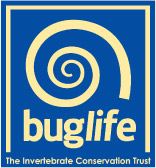Have you noticed a breeze of change blowing through the NGO world?
At Plantlife, their much-loved Chief Executive, Victoria Chester, is moving on to a higher vocation and so they are looking for a new leader.
 The Freshwater Habitats Trust has emerged, like a dragonfly, from the waters of Pond Conservation – a new name and a shiny new website.
The Freshwater Habitats Trust has emerged, like a dragonfly, from the waters of Pond Conservation – a new name and a shiny new website.
 Buglife has a shiny new website too.
Buglife has a shiny new website too.
For people who may be cynical about logos, this morning’s blog is a great advert for the impact of a well thought out and well designed one – just look at the three on the page here and marvel at how brilliantly they help advertise what each of these organisations is about.
Freshwater Habitats Trust sounds like an inspired renaming.
In the “You Readers” blog I asked whether replacing fiddlers with standups would have averted disaster on the Titanic”.
The comment flew clean over Douglas’s head but Doug replied no – the iceberg would still have been hit. (I’ve changed the order of words just to bring a bit of extra anxiety to your lives).
So there we have it, a bunch of jokers and fiddlers lined up against “the crushing weight of established orthodoxies on all things environmental” – in other words we’re doomed!
I’m off to the “Is the Countryside Dead” talk at the Blenheim Literary Festival today. It’ll be interesting to see if the talkers concur.
But if there is a wind of change blowing through the cosy world of the NGOs then perhaps the collaboration that produced the depressingly grim State of Nature report can be extended to all envionmentally concerned organisations, clubs and individuals in taking their own advice and working closely together to aggressively lobby government and in the process get the Great British and worldwide public onside?
Phil.
I don’t share your pessimism I’m afraid.
Doug.
Doug, I’m not pessimistic either, I believe the younger generations will sort it out. I’m actually writing to them through this blog! I just hope the situation is not as critical as the scientific community would have us believe (with the balance of nature totally destroyed by shifts from negative to positive feedback loops that Lovelock wrote about).
If I’m pessimistic its with my generation who I know, by and large, are hooked on the OVER-consumerist lifestyle they’ve been sold by the marketing man to the extent that even those who are connected to nature won’t lend a hand to the campaigning effort. I’ve several megabytes of emails that prove the point!
To my simple mind, more of the same is not going to fix the State of Nature. Closely coupled collaboration with the backing of rapidly increasing public support (in the order of millions), aggressively lobbying government along the lines of, say, the oil and motor industry, will precipitate real change.
Hugh Fearnley-Whittingstall moves mountains through his own efforts, a very clever man (and hero bordering on legend) – why has the combined forces of all the NGOs so far failed over the 40-60 years I’ve been watching – as evidenced by the State of Nature? My answer – fragmentation!!
Phil.
Yes. Maybe “pessimism” was the wrong word.
Maybe “exasperation” (as I think you’ve quoted on another blog similar to Mark’s) or “frustration” might have been a better word for me to use with regards to what I don’t particularly share with you right now.
Maybe I should be more exasperated or frustrated.
Hmmm…. as long there is some sort of time reserved for humour (or some sense of humour of sorts or brief intervals of levity) to go along with the grim-faced endeavour, then maybe that is the way forward?
Which is is your generation by the way? The one you do feel pessimistic about.
“The one you do feel pessimistic about.”
I can’t answer for PD but the one I feel pessimistic about is queued outside every Apple store right now
Doug, I gave it away when I said I’ve been watching for 40-60 years. I know what you mean about humour I’ve tried it myself in here in setting myself up as characters from black adder, not that it did me much good. Porritt thinks we shouldn’t be too uptight as well but as I say the old approach has resulted in the state of nature we now have. QED?
Doug, this is an example of the feedback I get from the new thinkers:
http://www.youtube.com/watch?v=6z5TIFr5XMo
It explains why I am always stating the obvious, not that its really coming from me its just me regurgitating the words of the clever people such as David Foster Wallace.
40-60 years.
That makes you what Phil?
45? 70?
Somewhere in between no doubt.
Good luck though with your attempts to write to the younger generation(s) through this blog…
Do you feel they are listening to you?
And as for the apple stores that Filbert and Douglas mention…. I guess I’ve missed something. Has something important happened? I haven’t watched the news all week so I guess I’ve missed the big story?
“Has something important happened? ”
No …
http://newsthump.com/2013/09/19/man-with-ios7-walking-around-office-like-he-owns-the-place/
http://www.newsbiscuit.com/2013/09/19/iphone-user-has-out-of-phone-experience-in-between-operating-systems/
Doug, Do you want to include me on your birthday card list? If so get in touch via Mark, all contributions gratefully accepted!
I do get some interesting feedback from members of the younger generations but they do seem to be doing quite well without me and as I say they are hungry for change whereas my generation is apparently not – my earstwhile friends at a local ornithological society (average age 45 to 75!!) were quite happy to keep their COLLECTIVE head firmly entrenched in the sand!
At five foot nothing many things fly-over my head, if you add long/clever words without illustrations it gets even worse……however saying that, I sadly feel “some” of the younger generation are just as keen on over consumption as some of those elders, come on look at this weeks big story (BIG STORY?) and a particular video game release, how many youngsters stood waiting over night, or how about a cross section of those standing in line like consumer zombies for the next Apple product release, NO I feel there are to few younger’s who care (lets hope it only takes a few to effect a change) to feel confident about the future of wildlife/conservation etc
“but they [the younger generations] do seem to be doing quite well without me”
I’m not surprised…
Doug, thanks for that! The best you can do?
“breeze of change” or just more of the same? Why on earth do we need a Wetland Habitats Trust? We already have WWT, RSPB, Wildlife Trusts all looking after massive wetlands.
Why Derek, because they fail to act when Natura 2000 sites are damaged. Probably not enough kudos in it, biting the hand that feeds them might be one reason? See Mark’s guest blog of 17 January, this issue still remains unresolved. ok in the scheme of things, not a Walshaw but it’s an opportunity lost etc. The only NGO which showed any interest was Buglife.
Another deafening silence resounds around National Nature Reserves, see http://you.38degrees.org.uk/petitions/stop-rethink-national-nature-reserves-as-open-access
On a positive note, I can say we also work well with some of their staff.
Very smart Buglife website and usefully I’d missed the news about bees and neonics. Particularly resonant in light of Nick Clegg pronouncing the coalitions greenest Govt ever mantra. Of course this is as much to do with Mr P our greenest Environment SoS. Anyway, off to save some meadows, sure Plantlife would approve.
Mark.
Which reminds me.
I must go to the bank and cancel my standing order to “pond life”, or “pond conservation” or “Freshwater Habitat Trust” or whatever they’re called now.
Along with the Bat Conservation Trust (which I’ve never financially contributed to I must admit) I regard them to be up there in terms of absolutely the least effective wildlife(y) NGOs there are in the UK today.
I hear some people regard them as good – but I’ve seen little evidence of that personally and would really like it if someone from that particular organisation could demonstrate (with evidence if possible) why and how they are an effective group – because I don’t see it (after two or three years paying them money).
Maybe someone will comment on here and put me right? (Ripples, their monthly e-newsletter is not helpful in this respect by the way).
I genuinely hope so, or I will feel I’ve wasted a wee bit of money over the past couple of years or so.
As for “plant life” and “buglife” – they’re in a different league as far as I can see.
I think they’re both excellent.
There’s a widely held assumption that our environmental problems are largely physical. Which is rubbish. Most of the answers are out there in existing cutting edge projects – and not just for wildlife but for key areas like water management. As I’ve pointed out before, there is a very sharp contrast between species for which action has been taken – very largely successful – and the wider countryside – very largely disastrous. Similarly, I’m convinced we could actually save public money, not spend more, if its was directed to what we need, not what we’ve always done. The barrier is institutions and attitudes which an incredibly broad ‘establishment’, including most conservation bodies, seem to be signed up to. Just imagine for a moment England’s third biggest land manager, The National trust, questioning the way we do farming in the same way that England’s biggest land manager, the Forestry Commission, questioned the way we do forestry during the 1990s in the aftermath of the Flow Country. Now that would make me feel optimistic.
Roderick, you’ve made it to hero status!
The great Norman Moore made the observation that when he joined NCC in the early 1950s, he thought that what was needed was more science. By the time he retired in 1983 he realised that by and large, the science was there, what was needed was the courage to act upon it. This is as true today as back then.
Sounds fair.
Doug, Oh Bertie! gets it as well. Things are looking up!!
Meh?
I attended the “Does the government understand the countryside” and “Is the countryside dead” debate at the Blenhiem Literary Festival yesterday at which the science writer and broadcaster Colin Tudge called for a complete rethink of our approach.
I made the point that fundementally we have to replace ourselves with the bio-sphere at the centre of “the system”.
The bio-sphere will survive quite happily without us but we are totally dependant on a healthy bio-sphere for our ongoing survival. Anybody who disagrees with this fundemental point (made by Jonathon Porritt et al – not me) is a fool.
September 21 2013 is the courage to act about to be unleashed?
So could freshwater habitats be a competitor to WWT?